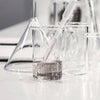
Sodium Lauryl Sulfate vs. Sodium Laureth Sulfate
Sodium lauryl sulfate (SLS) and sodium laureth sulfate (SLES) are both surfactants commonly used in cleaning products and shampoos. While they sound like nearly identical compounds, their difference lies in the manufacturing process. When SLS undergoes a process called ethoxylation, it becomes SLES. This makes the surfactant gentler and less irritating.
What Is Sodium Cocoyl Isethionate?
Sodium cocoyl isethionate (SCI) is also a surfactant. SCI is derived from coconut oil fatty acids and isethionic acid. We use SCI in our shampoo bars as a gentle cleanser. SCI is an excellent cleansing agent which helps create a rich lather to remove buildup while also hydrating the skin, making it a great shampoo ingredient. We chose SCI because it is gentle but so effective!
Why Do Shampoo Surfactants Matter?
Shampoos need some sort of surfactant in their formula to clear our buildup, dirt, grime, and dead skin cells. ALL shampoos have surfactants! Surfactants reduce the surface tension of a liquid, enabling the liquid to spread and break down oil – exactly what you need to cleanse your hair. However, as you can see, not all surfactants are the same! They vary in strength, making some more harsh and stripping than others.
The strength of a shampoo is determined by how effectively it breaks down hair soils (sebum, dead skin cells, pollutants, and hair product residue) through emulsification, penetration, and solubilization. Essentially, this means how rapidly and effectively it can break down the grime on the scalp and cleanse the hair. Both SLS and SLES are considered strong surfactants based on the strength of their cleansing properties.
SLS is a controversial ingredient because of its potentially irritating properties. One study found that it can disrupt the skin barrier by disturbing skin lipid composition. SLS led to increased trans-epidermal water loss (drying out the skin) and caused irritation. That said, the concentration of SLS plays an important role in how much irritation it might cause to the skin. In higher concentrations, SLS is more likely to be damaging. At a lower concentration, it may be less irritating.
What Kind of Shampoo Is Best?
Only you can decide what shampoo is best for you based on your hair type, ingredient preferences, and personal goals. It helps to become familiar with ingredients so that you can identify what works best for your hair. But there are other clues you can look for in product descriptions to determine what products to try.
If a shampoo is described as clarifying, it is going to be stronger and potentially more drying. Clarifying is an important part of any hair routine to remove buildup and avoid any irritation. However, clarifying shampoos should only be used a few times a month, not every single wash day. And it’s important to note that a shampoo can be clarifying without sulfates!
If a shampoo is described as gentle, it is not going to be as harsh or stripping. It will still have surfactants, as discussed earlier, but they might be less intense, like sodium cocoyl isethionate.
If you wash your hair a few times a week, you can use a gentle shampoo most of the time – sometimes, all you need is a little more shampoo or a double wash to get the job done.
Sulfate-Free Shampoo Bars
We chose to formulate our shampoo bars without sulfates because of the potential irritation and damage they can cause. This makes the bars more universally accessible and safe for all hair types – curly, kinky, and color-treated included! Plus, with plant-based ingredients and plastic-free packaging, they are much lighter on the environment than your average shampoo.
Try our shampoo bars today!





